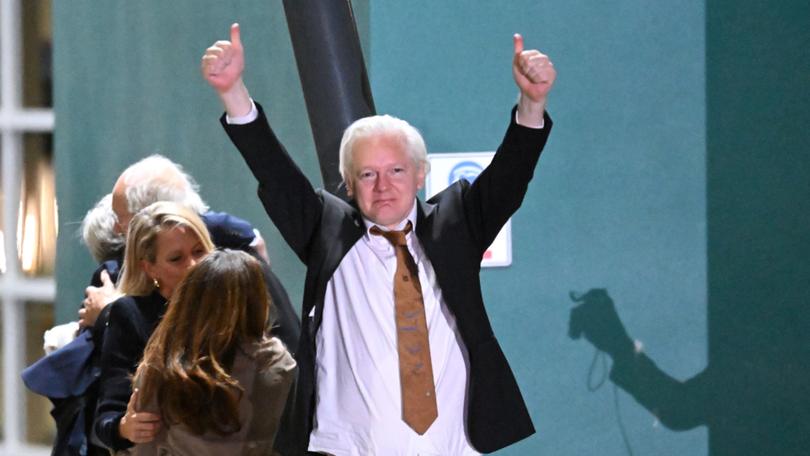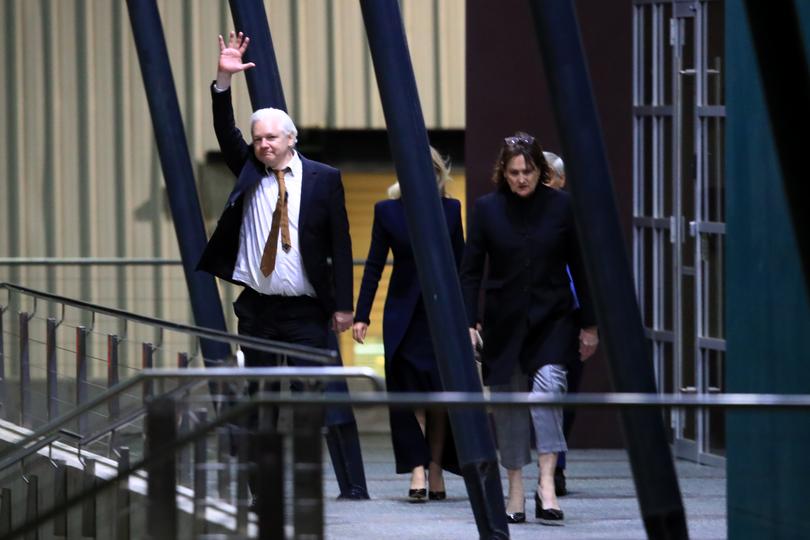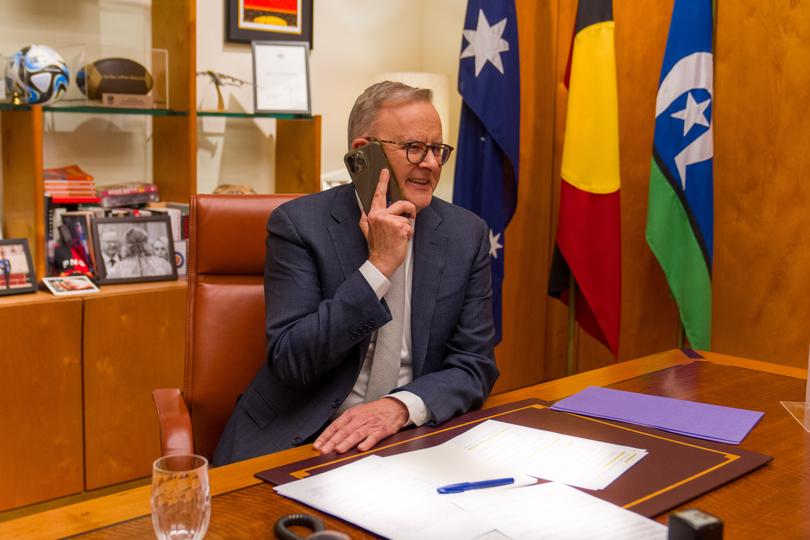Julian Assange’s legal team to seek presidential pardon as Coalition slams Albanese’s response
Julian Assange’s legal team say they now want the whistleblower to be pardoned by the United States President, as his return home to Australia after a 14-year legal battle is met with mixed reaction.

Julian Assange’s legal team say they now want the whistleblower to be pardoned by the United States President, as his return home to Australia is met with mixed reaction.
The WikiLeaks founder — seen by some as a hero and others as a villain who put lives at risk — landed in Australia on Wednesday night, hours after pleading guilty to one charge of espionage in the US outpost of Saipan, relating to the troves of top secret documents he obtained and published.
Ending a 14-year legal saga, Assange was sentenced to time already served, with the judge taking into consideration the 62 months he spent in the United Kingdom’s Bellmarsh prison.
Sign up to The Nightly's newsletters.
Get the first look at the digital newspaper, curated daily stories and breaking headlines delivered to your inbox.
By continuing you agree to our Terms and Privacy Policy.He flew home, accompanied by US Ambassador Kevin Rudd and UK High Commissioner Stephen Smith, as a free man. Stepping off the tarmac, he embraced his wife Stella Assange and father John Shipton, and was met with raucous applause and celebration at the airport.
His supporters later turned out in droves to a Canberra hotel where Mrs Assange and his lawyers called a late night press conference, hoping to get a glimpse of the man - despite him never appearing - who has for so long divided public opinion.

In a separate press conference at Parliament House on Thursday, Mrs Assange pleaded for patience and privacy as her husband readjusted to life as a free man, and would not be drawn on whether he would continue his pursuits as a whistleblower or if he would “do it all again”.
“He needs time to rest and to recover, and he’s rediscovering normal life. And he needs space to do that,” she said.
His legal team say they will now focus on trying to get Assange pardoned by the US president.
“President (Joe) Biden or any subsequent president absolutely can, and in my mind should, issue a pardon for Julian Assange,” his US lawyer Barry Pollock said.
“Obviously he’s just been released, he’s just gotten home, and I suspect that will take some time. But I certainly hope and expect that the same kind of support that he received when he was in prison will again gather steam, and the president or the future president will have the wisdom to do so.”

Before Assange could be reunited with his family on Wednesday night, he spoke with Prime Minister Anthony Albanese, who his team have credited as vital in getting him home.
According to Assange’s lawyers, he told the PM how he had “saved his life”, and thanked him and his diplomatic “A-team” for getting him home.
Mr Albanese called a press conference coinciding with Asssange’s arrival to spruik the work of his government and Australian diplomats in working “tirelessly” on ending the case.
“This is the culmination of careful, patient and determined advocacy, work that I am very proud of,” Mr Albanese said.
He said regardless of whatever people’s views are of Assange, the legal battle had “gone on for too long” and there was “nothing to be gained” by further incarceration.
But the phone call has attracted criticism from the Coalition, who say it wasn’t appropriate, and might “not age very well”.
Shadow home affairs minister James Paterson expressed sympathy for Assange’s loved ones and supporters distressed by the long legal battle, but said Mr Albanese shouldn’t make comparisons between the whistleblower and “innocent” detained Australians like Cheng Lei, Sean Turnell, and Kylie Moore-Gilbert.
“These were Australians who were innocent. They were persecuted for other reasons, by authoritiarian power,” he said.
“Mr Assange evaded the war for extradition requests, first by hiding in the Ecuadorian embassy (in London for seven years), then by using his legal rights in the United Kingdom to challenge them over so many years.

“He is now someone who has pled guilty to very serious national security offences, which are not just offences against the United States, they’re offences against the Five Eyes intelligence gathering alliance, including Australia, because they put the sources of that alliance at great risk.
“I think the Prime Minister’s embrace of Mr Assange might not age very well once Mr Assange starts tweeting again and his contemporary political views are shared with the public.”
Simon Birmingham, the shadow foreign affairs minister, claimed the phone call risked damaging the US-Australia alliance.
Standing alongside Mrs Assange on Thursday was independent MP Andrew Wilkie — co-chair of the multipartisan parliamentary group supporting Assange — who said that the end of the whistleblower’s plight would benefit Australia’s relationship with the US.
“The incarceration of Julian Assange was a thorn in the side of that relationship... So I now see reason to be very optimistic about that bilateral relationship,” Mr Wilkie said.
Greens senator David Shoebridge added: “If an Australian Prime Minister talking to an Australian citizen challenges the relationship with the United States, there is a problem with the relationship”.
Foreign Affairs Minister Penny Wong said if Senator Birmingham was of the view the PM’s response had damaged the relationship, he should also criticise his colleagues who have advocated for Assange’s release.
“Senator Birmingham should answer whether or not Senator Canavan’s outspoken support for Mr Assange has damaged the alliance,” she said.
“I mean, I think we know what the Opposition is playing at. We made clear our views to our friends and allies in the United States.
“The pathway to this is obviously the court decision.”
Under the plea deal, Assange was not allowed to enter the US without permission and was ordered to destory any unpubllished documents.
Mrs Assange said her husband was also “not allowed to make freedom of information requests from the US government”.

